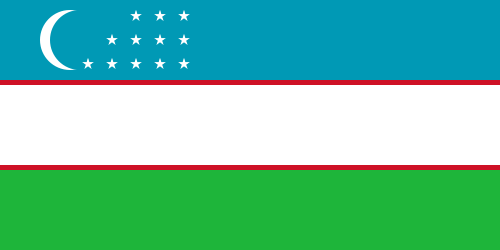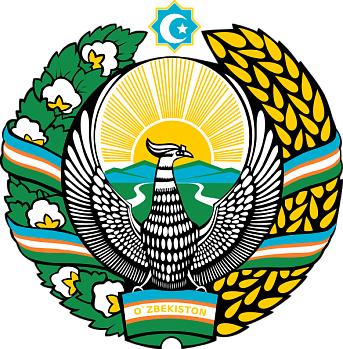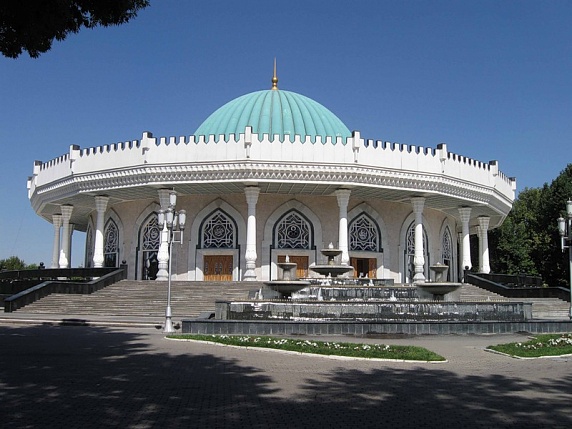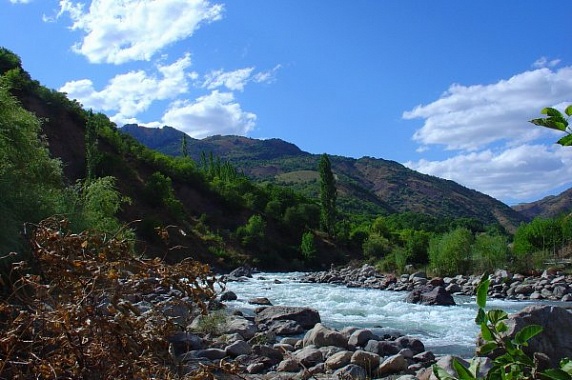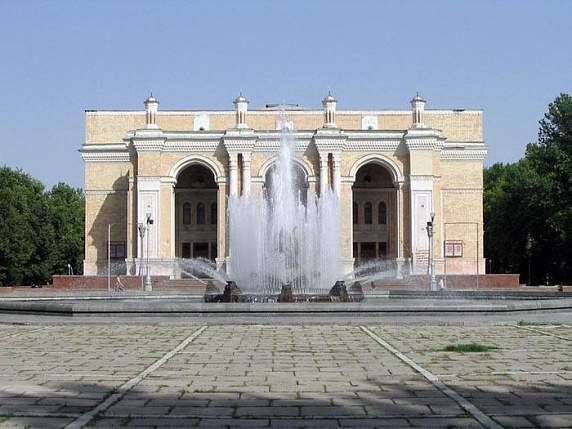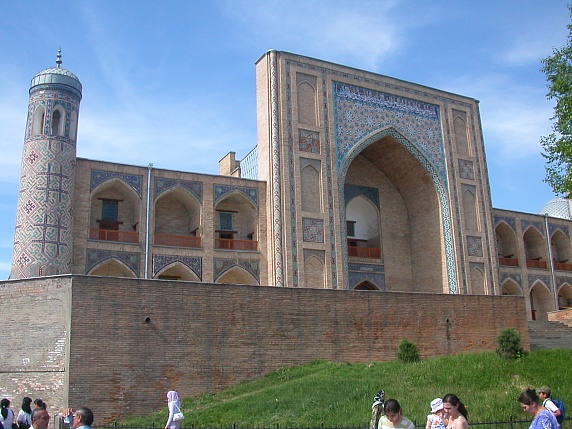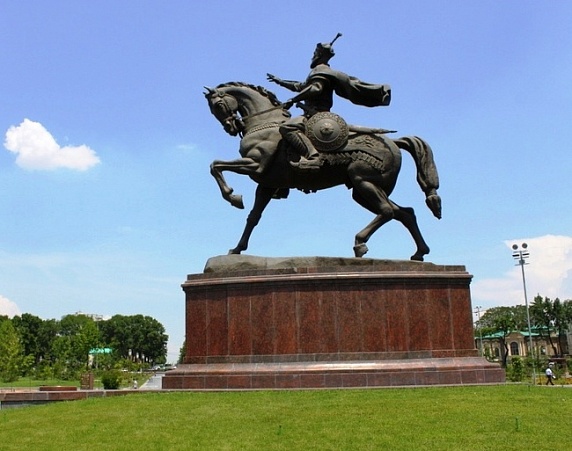 la República de Uzbekistán
la República de Uzbekistán
Acting Foreign Minister Sergey Lavrov’s remarks and answers to questions at an MGIMO University branch in Uzbekistan, Tashkent, January 16, 2020
Mr Kamilov, Mr Islamov, friends,
To begin with, I wish a Happy New Year to you.
I’m happy to be here today at an event that is being held as part of opening an MGIMO University branch in the capital of Uzbekistan. I’m pleased to speak before the students and the faculty led by our university graduate Mr Islamov. Clearly, opening an MGIMO University branch is an important step in our foreign policy cooperation in the sphere of education and coordination of our actions. It also reflects the growing interest in the Russian language and education, which is actively supported by President Mirziyoyev. As far as I understand, you now have eight branches of Russian universities in Uzbekistan. This is not the final number. Today, during our conversation, President Mirziyoyev said there are plans to open several more branches of Russian universities. We will do our utmost to cooperate in these endeavours.
Last year, MGIMO University marked its 75th anniversary. Over the past three quarters of a century, it has come a long way and become a truly unique research and training school. I’m confident that you will carry on the glorious traditions of training highly qualified specialists in international affairs in a wide range of areas, primarily, of course, the diplomatic service, but not only it, because MGIMO University graduates are in demand in other public services and private businesses.
The efforts to train such specialists are all the more in demand, as the importance of diplomacy and the ability to negotiate has increased many times over. I would like to note that tectonic processes are underway in the modern world that are associated with the ongoing redistribution of the global balance of forces and the formation of a fundamentally new, more democratic and pluralistic, multipolar international order. New centres of economic growth, financial power and political influence are emerging in the Asia-Pacific Region, Latin America and Africa, which many refer to as the continent of the future, the potential of which remains untapped. I’m confident that this historical era will last a long time, but this is an objective process, and it can’t be stopped.
Western countries – the historical West, as they say – have been dominating in the world perhaps for at least five hundred years. This era is now receding in the past. It is time to share power and influence and to make agreements with new strong players. Unfortunately, our Western colleagues are trying to torpedo these processes and hold on to their position of power, but life makes them act according to the objective trends of global development instead of based on unilateral geopolitical attitudes. Today, alongside these processes and the need to develop relevant forms of interaction and cooperation, the demand for a completely new level of trust and coordination among all these leading international players is growing in order to face the serious challenges and threats that cross borders today. There is no way to hide from them behind national borders. Terrorism, drug trafficking and other forms of organised crime, as well as cybercrime, which today requires new non-standard approaches to prevent it from causing huge damage to all the countries in the world, are among the most terrible threats. I do not even mention such a traditional issue as the proliferation of weapons of mass destruction. By the way, climate change is another one of these threats and risks. They can only be addressed together under the umbrella of the United Nations, on the firm ground of its Charter and other universally applied norms of international law.
Organisations of which Russia and Uzbekistan are members operate on the grounds of mutual respect, equality, the search for a balance of interests, compromise and consensus such as the CIS and the SCO. Russia’s work at BRICS and in the Russia – India – China format, which we abbreviate as RIC, is also based on these principles. I would also like to mention the G20, the establishment of which several years ago as well as the creation of the mechanism of its summits reflect the West’s growing understanding of the need to abandon its dictate in the world economy and to come to terms with the new centres of power. As you know, the G20 includes the G7, which until recently tried to govern the global economic and financial processes alone, BRICS countries and a range of rapidly growing economies of the developing world, which share the vision of the BRICS on principal issues. Without doubt, the G20 is turning into a forum for political discussions, which allows large powerful countries that are not members of the UN Security Council to get involved.
Of course, it is clear that political coordination needs to improve, given that reckless – let’s call a spade a spade – actions by our American partners and their closest allies, unfortunately, led to disastrous consequences in the Middle East. Iraq was destroyed, and is now struggling to restore its integrity and ability to bring life in the country back to normal. Libya was also destroyed, and they have a long way to go before rebuilding their statehood. An attempt was made to do the same in Syria. However, this time, responding to the request from the legitimate government of the Syrian Arab Republic, the Russian Federation provided, I believe, very effective assistance to the Syrian people in warding off the threat posed by global terrorism and the Syrian people have repelled it. Some less significant challenges facing the country have yet to be addressed. We helped the Syrian people to defend the statehood of their country. I believe this should serve in the future as a good example of how to prevent this sort of aggressive and reckless attempts to decide the fate of whole regions from overseas or any other place on Earth, for that matter.
The situation around Iran is doing much harm to strategic stability as it has evolved into a crisis after the US unilateral arbitrary pullout of the Joint Comprehensive Plan of Action (JCPOA) on Iran’s nuclear programme and the Intermediate-Range Nuclear Forces Treaty (the INF Treaty) – a pullout which is, essentially, responsible for dismantling this very important agreement on the non-proliferation of nuclear weapons, as well as for giving rise to tensions in the context of arms control, the non-proliferation of weapons of mass destruction and the limitation of arms, primarily, nuclear weapons.
We are also seeing ongoing attempts to use unfair methods of competition – now we move to the economy. Washington is still trying to impose American approaches outside the G20 and the World Trade Organisation formats. It is impeding the WTO activities as the WTO mechanism for settling disputes cannot function properly because of the US position. Meanwhile our American colleagues are trying to push through on a bilateral basis their decisions on how to resolve global problems, having no scruples in actively resorting to protectionism and unilateral unlawful economic sanctions, openly abusing the status of the dollar.
It seems to me that these methods of waging trade and other wars, including hot wars, have no prospects in the future. Rather these will be methods of building cooperation while abstaining from dictating others, as well as threats and zero-sum games. As I said before, we need to promote the value of dialogue, consensus and mutual respect. Only in this way can we move along the road to resolving global issues based on truly sustainable decisions, instead of short-term ones that are geared to some domestic political events or electoral cycles.
We are now introducing multilateral diplomacy formats such as the Astana process. Russia, Turkey and Iran are actively involved in resolving the Syria crisis, not only in terms of stabilising the situation on the ground but launching the political process as well. The Constitutional Committee became operational. This is an ongoing effort. It is no accident that the Astana process has drawn the attention of other countries as well, with Jordan, Iraq and Lebanon having an observer status in this multilateral format. Moreover, when we address the Syrian, Libyan or any other international issue, we never force anyone to do anything against their will and never impose anything on anyone.
We are pursuing a foreign policy that promotes pragmatism and realistic solutions rather than putting forward high-profile initiatives designed to produce an immediate propaganda effect, but which contain zero specific steps to bring a solution to a particular problem. Our initiatives aim to unite the efforts and capabilities of various states. For example, an initiative to form the Greater Eurasian Partnership, which President Vladimir Putin put forward during the Russia-ASEAN Summit in May 2016, serves this purpose. This partnership is supposed to combine the capabilities of the EAEU, the SCO and ASEAN member countries. Similarly, we propose adopting collective approaches to agreeing upon general principles for promoting non-proliferation of nuclear, chemical and biological weapons. There are many challenges in this area that are related to our Western colleagues’ attempts to steamroll the verification procedures for themselves and their unwillingness to transparently consider the problems in these areas.
Of course, like any other responsible country, we want to have a friendly external environment and neighbourly relations and to maintain constructive interaction with all our foreign partners without exception in all formats around the world with the understanding that our colleagues are willing to reciprocate.
So, we note with satisfaction that Russia and the Central Asian countries are linked by alliance and strategic partnership based on the principles of international law, respect and consideration for each other's interests, as well as the search for a balance of interests when considering any issues.
This, of course, fully applies to our alliance and strategic partnership with Uzbekistan. Our trade is steadily growing, and our leaders have set the goal to reach the level of $10 billion. So far, we have reached about half this amount. Upcoming events, including a meeting of the Intergovernmental Commission on Economic Cooperation, will be used to outline concrete steps to implement the tasks set by the presidents.
We have ambitious joint projects ranging from energy, including nuclear, to engineering. The total volume of Russia’s investment in the economy of Uzbekistan exceeds $9 billion, with over 1,700 enterprises with the Russian capital operating in Uzbekistan.
We work closely at various multilateral venues, including the UN and the CIS, which Uzbekistan is currently chairing, and the SCO. These links are deep and effective.
We believe the CIS fully serves its purpose as a structure in the post-Soviet space where all new states may discuss any arising questions. I think the full unifying potential of the Commonwealth has not yet been unlocked. We share the priorities of Uzbekistan’s CIS presidency this year and are ready to do everything we can to help implement them.
We consider important our joint work in the SCO and support active cooperation between Uzbekistan, on the one hand, and the EAEU and CSTO, on the other. I discussed this today with President of Uzbekistan Shavkat Mirziyoyev and my counterpart, Foreign Minister Abdulaziz Kamilov.
The Eurasian Economic Union is developing fairly quickly and successfully. Common markets of goods, services, capital and workforce have been created. International contacts with third countries are growing. Free trade agreements have been signed with Vietnam, Singapore and Serbia. Contracts with Iran and China have been signed. Talks are underway with Israel, Egypt and many other countries including Latin American states, as well as with international integration associations, including ASEAN. Ties between the SCO and the EAEU are growing stronger.
We are conducting useful dialogue with our Uzbek friends on the best ways to develop practical cooperation with the EAEU.
Friends,
This year we are celebrating the 75th anniversary of Victory in the Great Patriotic War. Our peoples fought against Nazism shoulder to shoulder and together with other Soviet nations made a decisive contribution to the liberation of Europe and the rest of the world from the Nazi horrors. The victory laid the foundations of the modern international security system, including the establishment of the United Nations. The principles of its Charter are immutable. For all of their novelties, any reforms of international organisations and relations, which will be numerous, must by all mean rely on these principles that have universal value and are recognised by all countries without exception.
We must cherish the memory of the exploits of our fathers and grandfathers and must not allow anyone to rewrite history, call into doubt the results of World War II, or justify the crimes of the Nazis and their accomplices. Of course, attempts to revise the decisions of the Nuremberg Trials are unacceptable. We are witnessing such fairly active attempts in several countries, and regrettably, in European Union states that are continuously presenting themselves as a model of democracy. This is a very dangerous trend and must be countered.
We are looking forward to the arrival of our dear friends for the celebrations of the 75th anniversary of Victory in the Great Patriotic War on May 9, 2020. Naturally, we are looking forward to the arrival of our friends from Uzbekistan. I am confident that this great holiday will be observed in Moscow, Tashkent and other cities of our two countries. I know that the Park of Victory is being restored in Tashkent, and I hope that we will have an opportunity to take part in its opening ceremony.
In conclusion, I would like to wish students success in their studies. You will ensure the continuity of our foreign policy cooperation, primarily the foreign policy course of your state. I hope you will take part in forming and developing the agenda for cooperation between Russia and Uzbekistan. I hope the knowledge and skills that you will receive at this MGIMO branch will help you in all your undertakings.
Thank you very much. I am ready to answer your questions.
Question: We are studying economics, and we have even tried to apply systems modelling to it. But the range of multilateral organisations that are open to Uzbekistan make this foreign economic model extremely complicated. Which multilateral organisations, integration mechanisms and regional agreements could be most effective for creating this model and for the success of Russia-Uzbekistan relations? I hope our choice is not limited to the Eurasian Economic Union (EAEU)?
Sergey Lavrov: In principle, the economy is the basis for everything else. As you know, social being determines consciousness. Each country must make its own choice depending on its understanding of national interests, development goals and the form of development that will help it enhance the living standards. You can share your experience and solutions, but the choice ultimately rests with the government of sovereign states.
As I said, we maintain an intensive dialogue on economic matters. Our bilateral ties have been developing very rapidly and effectively in the past few years in accordance with the decisions taken by President of Russia Vladimir Putin and President of Uzbekistan Shavkat Mirziyoyev. As for multilateral formats, these include first of all the Commonwealth of Independent States (CIS), which has a free trade zone. Russia and Uzbekistan are working fruitfully within the CIS. We welcome the increase in Tashkent’s involvement in the CIS over the past few years. Uzbekistan holds the CIS presidency this year. By the way, the latest CIS summit held in Ashgabat in October 2019 adopted the Declaration on Strategic Economic Cooperation. This shows that new goals can be set at the CIS and attained in a more efficient manner if undertaken collectively, which is proof that serious attention is being given to the economy within the organisation. I have already mentioned the free trade zone.
As for the EAEU, it is also a form of dialogue. Uzbekistan is pondering the forms of interaction with the EAEU, especially since the establishment of the system of observer countries more than 18 months ago. Overall, the EAEU is a massive organisation with a combined population of 182 million, a common market of capital, goods, services and workforce, as well as a collective GDP of approximately $2.2 trillion. It is an impressive indicator as well.
The development logic at the EAEU was the same as in many other associations around the world, including the European Union. First we created a free trade zone and then proceeded to the Customs Union of Russia, Kazakhstan and Belarus, ultimately creating the EAEU, which Kyrgyzstan and Armenia joined as member countries.
I have mentioned the EAEU’s foreign relations, which are extensive. I believe that Uzbekistan will be able to see its prospects in this association during the ongoing consultations, in which Russia is actively involved.
Question: President Vladimir Putin yesterday proposed changing the fundamental law to directly guarantee the priority of the Russian Constitution in the international legal framework. Does this mean that Russia will follow in the footsteps of the United States, where the priority of national law is being implemented most fully? There are many examples when the Americans disregard international conventions and court decisions.
Could this lead to Russia’s withdrawal from the European Court of Human Rights (ECHR)?
Sergey Lavrov: The Russian Constitutional Court has issued an explanation according to which the provisions of the Russian Constitution prevail over everything else. This is not a unique situation. Some Western countries, in particular Germany and Britain, have such provisions as well. The United States interprets international law as a matter of little importance, and this is how the Americans have regarded it.
I would like to note that a country only assumes international obligations after ratifying agreements or treaties. Ratification must be formalised in a federal law. Laws must not contradict the Constitution. There is no contradiction here. We are committed to all of our obligations under the documents which we sign voluntarily and which our Parliament, made up of representatives of the people, ratify, making these documents part of our legal framework.
Question: All of us realise that Russia and Uzbekistan need each other. The term “strategic partnership” describes our partnership. What three main components of the strategic partnership can you name in this Russian-Uzbek union?
Sergey Lavrov: We are both strategic partners and allies. In 2005, our countries signed the Treaty on Allied Relations. This document remains in force and is a pillar of our collaboration. All agencies, including economic agencies, defence ministries, the Security Council, law enforcement agencies and secret services, maintain very close ties. We address many tasks while maintaining the security of Uzbekistan and the whole of Central Asia where the threat of terrorism and illegal drug trafficking is quite serious. We have reached large-scale agreements in the area of modernising the Armed Forces of the Republic of Uzbekistan and reequipping them with modern Russian weapons. Military-technical cooperation continues to develop very well. I believe that the security sphere is among the main and most tangible aspects.
The economy is the second no less outstanding direction. I have dwelled on this in great detail. Mutual investment volumes continue to expand, and we are adopting additional decisions allowing Russian and Uzbek companies to trade under easy-term plans and to reduce material and temporal outlays.
I believe that we have a rather packed programme of economic cooperation that, with due consideration for new tasks, will be discussed in great detail during preparations for the state visit to the Russian Federation by the President of the Republic of Uzbekistan Shavkat Mirziyoyev, scheduled for this year.
We are preparing a meeting of the Intergovernmental Commission on Economic Cooperation. On the whole, we are discussing dozens of major aspects to further expand our collaboration.
I would also like to mention cultural and humanitarian cooperation. I have already touched upon the fact that the people of Uzbekistan are highly interested in the Russian language and Russian-language education. We appreciate this very much. We appreciate the fact that Uzbekistan ranks among the countries contributing the greatest number of students to Russian higher education institutions. Over 29,000 students from Uzbekistan study in Russia, including over 6,000 at federal-budget expense. President of the Republic of Uzbekistan Shavkat Mirziyoyev has asked us to increase the number of scholarships which we provide each year. Most likely, we will support this request. We will see to it that the request materialises into specific decisions in the near future.
Apart from security, the economy, cultural and humanitarian collaboration, it would be wrong not to mention the fourth area, namely, foreign policy coordination. We voice common positions on an overwhelming majority of matters regarding the international and regional agenda. This is manifested most vividly on the Afghan track where Russia and Uzbekistan act hand in hand. They perceive national reconciliation and the creation of favourable conditions that would allow all ethnic, political and social groups, as well as religious denominations, to feel comfortable in Afghanistan as the only goal that can pacify the Islamic Republic of Afghanistan. Only the people of Afghanistan themselves can accomplish this. All the initiatives by Tashkent and Moscow are aimed at creating favourable conditions, which will allow the people of Afghanistan themselves to reach agreement without any external advice.
The range of our relations is sufficiently diverse. I repeat, they are allied and strategic in real life, rather than on paper.
Question: You are paying an official visit to Uzbekistan as Acting Foreign Minister of Russia. What position can you assume in the future?
Sergey Lavrov: Are you a journalist? You should enrol at the Moscow State Institute of International Relations (MGIMO).
All these years, immediately after graduation, I always honestly discharged my duties, instead of merely holding any positions. I continue to do this today.
Question: Today you had a meeting with President of Uzbekistan Shavkat Mirziyoyev. Have you mentioned Uzbekistan joining the EAEU? If so, what will the criteria be, and will it happen immediately or gradually?
Sergey Lavrov: I have already mentioned that the decision should be made by the country itself that wants to somehow diversify its external economic contacts and is using various formats. We, as friends, strategic partners, and allies at the level of governments and deputy prime ministers, are discussing in a very specific, substantive dialogue how the EAEU can interact with Uzbekistan. We are providing information and giving assessments, but the decision, of course, will be made by the President and the Parliament of Uzbekistan. This is the framework in which Shavkat Mirziyoyev and I have discussed it today.
Question: What have you agreed on?
Sergey Lavrov: Get a degree from MGIMO.
Question: You probably know how widespread the topic of artificial intelligence is in the modern world. It is even supposed to be used in international affairs, to analyse socioeconomic processes, and in modern politics. Can you comment on this?
Sergey Lavrov: Modern technologies are definitely of great help in both studying and working, primarily in terms of quickly gathering information from various sources, and the ability to compare facts. Now that life is changing so rapidly (this has never happened before, including in the international arena), it is important to have information, to know how to obtain it and use the facts derived from access to information.
In this sense, all areas of life are now being revolutionised. No wonder digitalisation of the economy has become the watchword in all countries, including Russia. Russian President Vladimir Putin has repeatedly said that the players who possess modern technology to the greatest extent will have the strongest position on the world stage.
Speaking specifically about diplomacy, in addition to the unconditional advantage that I mentioned (quick access to reliable information from different sources and the ability to compare it), probably neither artificial intelligence, nor anything else can replace a diplomat as a person. With all the scope for saturating your memory with knowledge, and the ability to simulate the development of a particular crisis, to reach a solution it is crucial to sit down with a person or several people that matter, look each other in the eye and start just discussing the interests of the parties involved and trying to find a balance between these interests. No machine will ever be able to replace face-to-face contacts.
Diplomacy is the ability to negotiate. You can’t reach agreement with a machine – it is a cold tool. A machine can beat anyone in chess. This is a highly intellectual game, but all the moves are prescribed, so all you can do is change their order, invent new methods of defence or attack. The game has rules that never change. In diplomacy, situations may arise that only a living creature with a natural, human intellect can identify and resolve.
Question: What is the structure of the Russian Foreign Ministry?
Sergey Lavrov: It is available on our online resources, on our website. We have recently established a new, 42nd department, which will deal with cyber threats. It is the Department of International Information Security. We have some 3,500 employees. Some departments deal with regional affairs, including four European departments, one North American and one Latin American department, four Asian departments, as well as one African and one Middle East department. Some departments are not concerned with regional affairs but with a particular function, such as the UN and the OSCE, or relations with NATO and the EU. We have four really important CIS departments, one that deals with CIS affairs and other multilateral organisations in the post-Soviet space, including the EAEU and the CSTO, plus the CIS departments that are in charge of European, Central Asian and South Caucasian affairs.
Question: You have said today that Russia will celebrate the 75th anniversary of the end of the Second World War. How will the Foreign Ministry contribute to this?
Sergey Lavrov: The Russian Foreign Ministry is directly involved in the events held to celebrate the 75th anniversary of Victory in the Great Patriotic War. Personally, I am a member of the Organising Committee for Celebrations of the 75th Anniversary of Victory. We plan to celebrate this event in every country, but especially in the countries where WWII battles took place, when our soldiers liberated Europe.
We are holding a series of events involving the maintenance of monuments, memorials and graves in cooperation with the host countries. These events have attracted public attention and active support in the overwhelming majority of states. Attempts have been made in some countries, primarily in the Baltics, to subdue the memory of the war and the great sacrifices it involved, primarily among young people. This is a different part of our work. It calls for daily efforts to attract the attention of international organisations to the importance of compliance with the provisions of the UN Charter and respect for the decisions of the Nuremberg Trials.
This is what our diplomats are doing. We have submitted an initiative to hold a special UN General Assembly session in May this year. Uzbekistan co-authored that initiative. We have also proposed holding a special event and adopting a declaration of the 75th anniversary of Victory at the OSCE. There are many more events involved, which together comprise a key priority sphere of our operation this year.
Question: We know that you made the acquaintance of many students from other countries, including Uzbekistan, at MGIMO, and that you interacted with many of them after graduation. Do Uzbek graduates have any special character traits? Do these traits have any influence on Uzbekistani diplomacy?
Sergey Lavrov: Every ethnic group and nation has specific features. I studied together and remain friends with many citizens of Uzbekistan who have become business and diplomatic leaders. I will not name them here so as not to offend anyone by not naming them. All MGIMO graduates regardless of their nationality and origin must be, above all, professionals committed to their countries. The most important thing is for the knowledge you receive to be used for the benefit of your people and your country and for strengthening its positions on the international stage, including when it comes to defence, the economy and culture. I believe that Uzbekistan, whose culture dates back hundreds if not thousands of years, has very many talented people who will be able to effectively attain these goals if they receive a good education.
Question: There are many interpretations of international law. Some believe that this area continues to develop dynamically, and others claim that it obviously lags behind the requirements of modern life. What is your perception of modern international law?
Sergey Lavrov: To put it simply, international law always lags behind international life because it is necessary to formalise and coordinate it. International law should be universally acceptable in order to become effective. As a rule, this implies conventions that are the subject of lengthy talks sometimes lasting many years. The concerned parties sign and ratify them. Conventions aim to respond to certain real-life events. For example, this concerns cybersecurity and cybercrime. Today, hackers steal money, cheat with card accounts and use cyberspace to undermine the functioning of vital infrastructure systems ensuring the operation of the energy sector and other areas. So far, there is no tool to combat this threat. We submitted a proposal to the UN sufficiently long ago (several years ago), and they approved it. The proposal was submitted following its coordination by SCO countries, including with the involvement of Uzbekistan, so as to draft generally acceptable rules for the responsible conduct of states in media space that would be universally interpreted and applied. Expert groups were established several times; and each of them took a short step forward. A working group has been established in which all UN member countries are currently involved. We have submitted the draft rules of responsible conduct to its members for consideration.
Here is a classic example. In the United Kingdom, when they want to build a path across a lawn, they first allow people to walk on it. Stones will be placed where they have trampled a path. One can say just about the same about international law. First, it is necessary to understand in what direction we might find an international-law tool. Of course, it is necessary to fulfil a convention after it has received international-law status, has been ratified by all states and has acquired mandatory status for them.
The main problem is that various parties, including our American colleagues, are now freely and boldly handling and interpreting international law. We have noted this today, while replying to a question by a Kommersant correspondent. Please note, this is a very interesting thing, and I discussed it in India yesterday at a plenary meeting of the multilateral conference Raisina Dialogue. I noted that our Western colleagues were using the expression “international law” less often. They have already started talking differently and urging everyone to comply with, honour and fulfil rules on which the international order hinges. No generally accepted document formalises this non-legal term. When we ask about the difference, they reply that the difference is that it is necessary to abide by rules on which the international order is based. And what are these rules? Does this amount to international law? If this is so, then why do we have to invent something?
In real life, for example, we have the ratified Convention on the Prohibition of the Development, Production, Stockpiling and Use of Chemical Weapons and on their Destruction (more than 190 states committed to it). The West did not like the fact that we caught the OPCW Technical Secretariat juggling around with the facts, in particular when it was investigating the alleged use of chemical weapons in Syria. We literally caught them manipulating the facts and we demanded that their behaviour should change and that they stop putting the blame on just any party, in this case, on Syria. Instead of dealing transparently and collectively with this, the West, by voting, pushed the decision to give the OPCW Technical Secretariat the right to name the perpetrators (although under the CWC, its only function is to respond to a party’s request to establish whether a prohibited substance was used by sending an inspector). Everything else is up to the UN Security Council. Despite the minority of votes (86 versus more than 100 votes of the participating countries) they have pushed the decision through that undermines the Convention. Now the OPCW Secretariat is trying in every possible way to evade being transparent about how it is implementing the Convention.
Now roughly the same is happening with the Convention on the Prohibition of the Development, Production and Stockpiling of Biological and Toxin Weapons and on Their Destruction (BTWC). The Americans refuse to create a multilateral, universal mechanism for verifying the implementation of this document, which would be understandable and transparent for everyone. They are trying to deal with all matters through closed-door, secretive bilateral contacts and agreements with individual countries; they are especially active in the post-Soviet space. We have signed a memorandum with Uzbekistan on closely cooperating in the field of biosafety and on the promotion of our common interests.
Take the Middle East peace process. There is an international law in the form of a UN Security Council resolution on the need to resolve the Arab-Israeli conflict. This is an international law. But our American colleagues said that they will have their own rules. And those rules would lead to a ‘deal of the century,’ something the Americans have been promising for four years now but no one has seen yet. Meanwhile, they have recognised the Israeli occupation of the Golan Heights as legitimate, as well as moving their embassy to Jerusalem, and said that the illegal Israeli settlements on the West Bank, established against the UN Security Council requirements, are now legitimate for the United States. So this is how it works, there is international law – and there are rules.
I have mentioned the WTO. The United States has simply blocked the dispute resolution mechanism through procedural tricks. When someone becomes concerned that the Americans are dishonest on the global markets, with trade deals or whatever, there is nowhere to complain to. So the Americans use this situation to offer bilateral channels, using threats, ultimatums and other pressure tools, trying to push their interests to the detriment of the interests of others.
We must respect international laws, I mean everyone. This is a serious matter for the international agenda.
